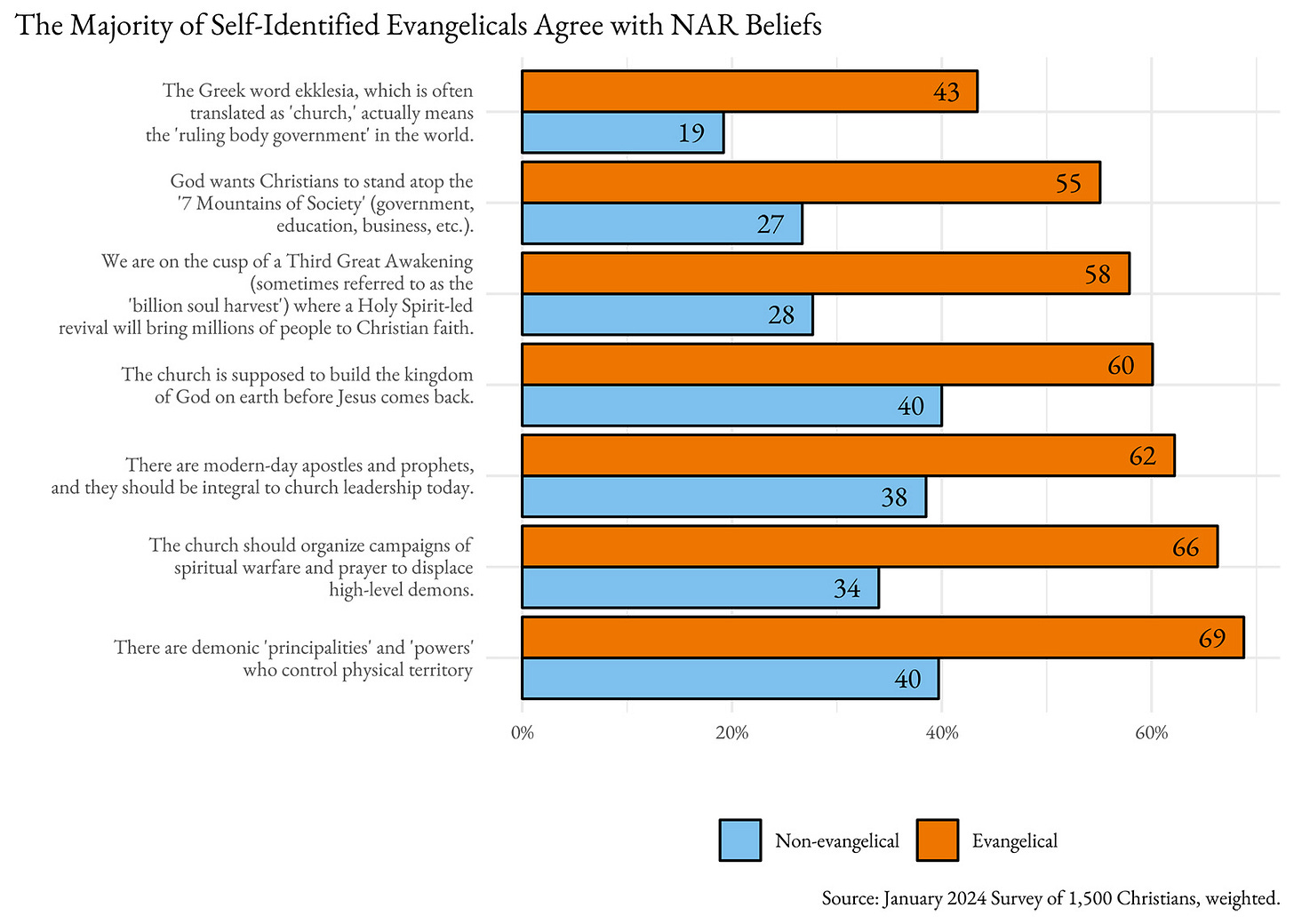The Atlantic’s Fear-mongering About Evangelicals
Are “tens of millions” seeking to “destroy the secular state”?
There is a certain kind of article about religion that pops up with some regularity in the mainstream media, the basic claim of which is, “Not only does a sect of ultra-right-wing Christians want to turn America into a Christian theocracy, overturning everything liberals hold dear, but they are closer than you think to doing it, because they have way more adherents than you think they do. In fact, there are tens of millions of them.” These articles have been running longer than the quarter century I have been reporting about religion, and while they may get certain facts right, they are sensationalistic, misleading, or just plain wrong.
The latest entry in this genre comes from The Atlantic, which is one of my favorite magazines, not least because of its excellent coverage of religion. Yesterday the magazine posted a piece titled “The Army of God Comes Out of the Shadows,” which is already a bit overheated—army? shadows? But the sucker punch comes in the sub-headline, which reads:
Tens of millions of American Christians are embracing a charismatic movement known as the New Apostolic Reformation, which seeks to destroy the secular state.
Now, I have barely heard of the “New Apostolic Reformation,” and I have never heard someone who is not a journalist or a religion professor talk about it. Was it really possible that the movement had “tens of millions” of adherents? Ready to “come out of the shadows”?
I dug into the story. I won’t waste a lot of time on the “New Apostolic Reformation”—you can read the story, which is interesting—but suffice to say it describes a Pentecostal version of Christian “dominionism,” which encourages Christians to try to run the country. One of its leading proponents, an evangelist named Lance Wallnau, has repackaged dominionism into what he calls the “7 Mountains” theory, which is that there are seven loci of power, and Christians should aspire to influence them all. (The “seven mountains” are government, business, education, family, arts, media, and religion.)
I wrote about Christian dominionism in 2011 in The New York Times, in a column about Christian anti-union sentiment. I described it much as The Atlantic does, as descending from a relatively obscure (to most of us) 20th-century theologian named R.J. Rushdoony. I wrote:
These “Reconstructionists” are believers in Christian Reconstructionism, the philosophy of R. J. Rushdoony, who died in 2001. According to Reconstructionism, a Christian theocracy under Old Testament law is the best form of government, and a radically libertarian one. Biblical law, they believe, presupposes total government decentralization, with the family and church providing order. Until that day comes, Reconstructionists believe the rights to home-school and to worship freely at least provide the barest conditions of liberty.
Here is how The Atlantic glosses Christian dominionism, by way of explaining the theology of one C. Peter Wagner, whose flavor of it presaged the New Apostolic Reformation:
Wagner also became captivated by a concept called dominionism, a major conceptual shift that had been emerging in conservative theological circles. At the time, the prevailing view was that God’s mandate for Christians was simple evangelism, person by person; the Kingdom would come later, after the return of Jesus Christ, and meanwhile, the business of politics was, as the Bible verse goes, rendered unto Caesar. The new way of thinking was that God was calling his people to establish the Kingdom now. To put it another way, Christians had marching orders—a mandate for aggressive social and institutional transformation. The idea had deep roots in a movement called Christian Reconstructionism, whose serious thinkers—most prominently a Calvinist theologian named R. J. Rushdoony—were spending their lives working out the details of what a government grounded in biblical laws would look like, a model for a Christian theocracy.
Wagner then—according to The Atlantic—rolled these beliefs into the New Apostolic Reformation, which holds that
[c]onstructing the Kingdom meant destroying the secular state with equal rights for all, and replacing it with a system in which Christianity is supreme. As a practical matter, the movement put the full force of God on the side of free-market capitalism.
At this point, we should note that not even 1 percent of American Christians have heard of Rushdoony or Wagner—they are not like Billy Graham or Joel Osteen or Ralph Reed or Jerry Falwell, or even B-level revivalists like Luis Palau. Go into 99 percent of evangelical churches, these names will draw a blank stare.
But let’s posit that they are behind-the-scenes influencers whose writing has been important even if their names have not become widely known. That leaves us with the question: How influential? Is it true that, as The Atlantic writes, “about 40 percent of American Christians … are embracing” this movement to destroy democracy? Here’s the key quotation from the article:
At this point, tens of millions of believers—about 40 percent of American Christians, including Catholics, according to a recent Denison University survey—are embracing an alluring, charismatic movement that has little use for religious pluralism, individual rights, or constitutional democracy. It is mystical, emotional, and, in its way, wildly utopian. It is transnational, multiracial, and unapologetically political. Early leaders called it the New Apostolic Reformation, or NAR, although some of those same leaders are now engaged in a rebranding effort as the antidemocratic character of the movement has come to light. And people who have never heard the name are nonetheless adopting the movement’s central ideas. These include the belief that God speaks through modern-day apostles and prophets. That demonic forces can control not only individuals, but entire territories and institutions. That the Church is not so much a place as an active “army of God” …
Tens of millions? Let’s go to the polling data. It comes from Denison University pollster Paul A. Djupe and Matthew Taylor, who ran a January 2024 poll of 1,468 self-identified Christians. Within that survey, half were self-identified evangelicals, half non-evangelical. The survey asked respondents to agree or disagree with “seven statements of charismatic theology which principally originated among the NAR [New Apostolic Reformation] networks.” Results:
As you can see, when asked if “God wants Christians to stand atop the 7 Mountains of society,” 55 percent of evangelicals and 27 percent of non-evangelicals—for 42 percent of all respondents—said yes.
This is where The Atlantic gets its figures, the “40 percent” of American Christians, which presumably they translate into the “tens of millions” of Americans in this shadow-y “army.” By a conservative estimate, there are 200 million Christians in America (though far fewer religious ones)—and if 42 percent believe in seven-mountains theology, well, yeah, that is over 80 million Christians.
But keep in mind: that number is extrapolated from 617 people, in one poll, agreeing with the statement “God wants Christians to stand atop the 7 Mountains of society (government, education, business, etc.).” Those 617 people are translated, by Atlantic math, into “tens of millions” who “are embracing a charismatic movement known as the New Apostolic Reformation.”
Where does one begin? First off, plenty of mainline Christians, even ones who believe in the separation of church and state, could answer “yes” to that statement. In a yes/no binary, they could simply prefer having self-professed religious people (“he’s a good Christian”) running things, than secularists or pagans. That’s not how I see the world, but it doesn’t correlate to “tear down secular society.”
Second, it’s pretty clear that most of the people answering the question are not endorsing some “New Apostolic Reformation”; rather, the poll is designed to test the pervasiveness of the NAR’s views. But plenty of people who endorse the views piecemeal might hate the movement.
Those 617 people are translated, by Atlantic math, into “tens of millions” who “are embracing a charismatic movement known as the New Apostolic Reformation.”
Plenty of Christians and non-Christians believe in demon possession—this is America; people believe in UFOs, reiki, Bigfoot, etc.—but not the NAR. Hence, polling whether people believe that “[t]here are demonic ‘principalities’ and ‘powers’ that who control physical territory” (one of the other survey questions) has close to nothing to do with NAR. There are probably ten people on my Kamala-voting street who would assent to that statement, their Buddhist prayer flags on the porch notwithstanding. Using that question to gauge support for NAR, or even the influence of NAR, is like asking “Do you believe in the Loch Ness monster?” to gauge support for Scottish independence. (Okay, not just like it, but you get the point.)
As I said, there is a history of these articles, scaring secular readers that the armies of Christian theocrats are coming for their government. A few years ago, the panic was all over the Christian, home-schooling “quiver-full” mothers having ten children apiece to add soldier to the Lord’s army. (When in fact it’s the secular Elon Musk who is trying to repopulate the earth.) It turns out that the quiver-full armies of Christian tykes never came, or at least we haven’t heard much about them. I suspect the same will be true of the New Apostolic Reformation and Lance Wallnau, who is basically a grifter selling gold-ish coins with Donald Trump’s face next to Persian king Cyrus’s.
Using that question to gauge support for NAR, or even the influence of NAR, is like asking “Do you believe in the Loch Ness monster?” to gauge support for Scottish independence.
To be clear, the political aims of right-wing Pentecostal Christians are concerning. They are anti–gay marriage, they would put confessional religion in public schools, they are climate-change deniers. They would ban books. I don’t even want to know their views on birth control. It’s a dumb platform. But it is standard Christian-right claptrap of Fallwell vintage, familiar to anyone who has been a sentient American at any point since the 1970s. The idea that now there is now some shadow-y army of “tens of millions” ready to take over is just magazine clickbait. It’s the liberal version of the conservatives’ “war on Christmas.” But it sells better than the banal truth: we are a divided country, politically—as well as a country with a high propensity to believe in the supernatural, of all kinds. It should surprise no one that many Christian conservatives believe in demonic possession, nor that they believe Christians make better leaders, whether of the Rotary club or the seven mountains. I disagree with them, but I’m not afraid of their so-called army.




So if I want to feel calm and reasonable, I agree with your analysis. However, when I worry that too many are easily swayed by misinformation, and think about how many would go passively along with a Christian theocratic government here (or a heavy bent in that direction), I can get worried. No, the Cossacks aren’t coming tomorrow, but the trend is not our friend from what I see.
Excellent article, especially your breakdown of the fear-mongering numbers based on a poorly designed and even more poorly interpreted poll.